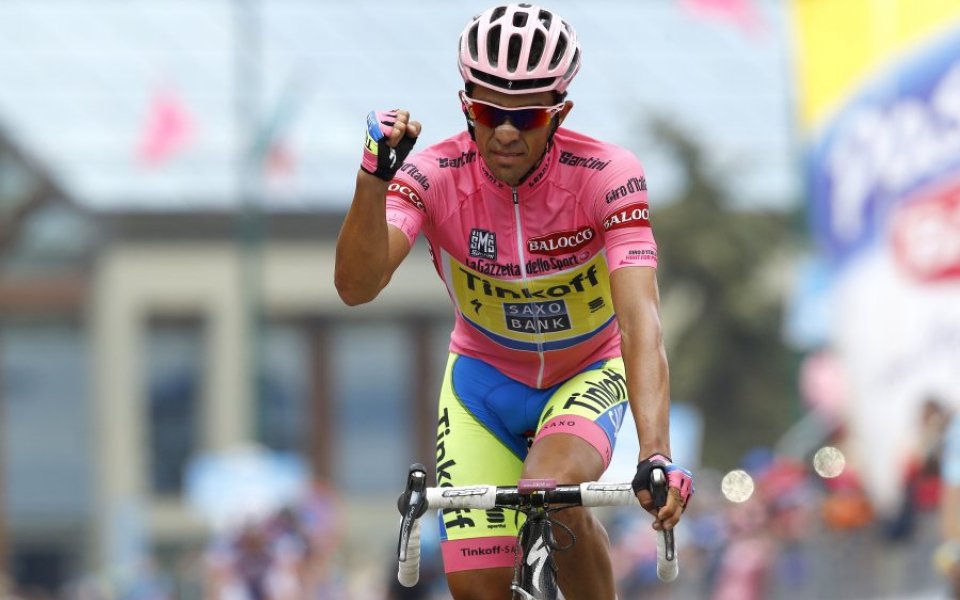Alberto Contador interview: El Pistolero sets sights on Chris Froome and aims for Tour de France victory in his final season

It seems like an incomplete comeback. On paper, Alberto Contador is the best grand tour rider of his generation. The Spaniard has won seven, including two Tours de France. Those numbers jump to nine and three if, as Contador does, you count the titles he was stripped of after failing a drug test. Yet El Pistolero hasn’t won a Tour de France since his ban ended in 2012.
The 2016 season should be his last in the sport and he aims to finish on top, riding away from his rivals over the summits of the Tour. Last year he came fifth, a shadow of his imperious best, after a hard Giro d’Italia victory little more than a month earlier left him struggling to follow Britain’s Chris Froome and Nairo Quintana when the race went uphill. Next year, he says, will be different and he likes the look of the staging ground.
“I believe I can adapt to the two time trials,” he told City A.M. “My rivals are very strong, Froome especially is good in time trials. Quintana is a young rider, always improving. He gets stronger towards the end of big races, and so I see him as a rival equal to Froome.”
Contador and Froome’s rivalry is becoming one for the ages. If 2013 went to the Team Sky rider, along with the Tour, then last year belonged to Contador who, after both crashed out of contention in France, recovered to win his third Vuelta a Espana, beating Froome in two summit finishes, the second after a brutal ascent of the Puerto de Ancares.
“I remember after the [Mortirolo] stage in the press conference I was okay, but later on the bus my body began to feel bad, I was vomiting, I couldn’t eat dinner and I realised I’d put my body right to the very limit,” he recalls.
Contador is a child of the sport’s dark years. In 2012 he tested positive for clenbuterol, a drug that can improve respiratory function, but has always denied cheating, blaming the failed test on contaminated beef. Surveys suggest he was extremely unlucky – only one meat sample out of 83,203 taken by the EU countries in 2008 and 2009 contained Clenbuterol.
He says he is convinced the sport is much cleaner than in the past.
I sincerely think so,” he adds.
"I’m very happy and proud of how they’re doing things in cycling. I believe the philosophy has changed completely. There can always be a stupid rider. But I believe that for top-level riders it would be impossible to do anything that wasn’t clean, because the controls are very effective. It would be suicide."
Part of the change in philosophy has been a move for riders to be more open with their data. Froome this month published results of tests on his power output and physiological capacity, pushed on by accusations at this year’s Tour.
Contador doubts Froome’s numbers will be enough to quell suspicion.
I think it’s complicated. The numbers are difficult to interpret,” he says. “In the end the public will concentrate more on what it sees on the television. I don’t think it will change everyone’s point of view."
Judging by reactions on social media, Contador is right. There is too wide a knowledge gap for the public to be able to interpret the data without help from sports scientists, and any test of a grand tour winner will reveal an extraordinary physiology in the grey area between what is possible and impossible.
It is, after all, the job of coaches and riders to push the threshold to the impossible. What remains to be seen is if Contador can push these limits again in 2016.
“I’m confident,” he says. ”This year I prepared myself 100 per cent for the Giro. The team hasn’t made many big signings. But I’m confident in the riders around me and Oleg [Tinkoff, owner of the Tinkoff-Saxo team] has a lot of confidence in me.
“He has invested money from his own pocket, and I would like to repay that confidence.”
If he does, it still would not rank as the hardest challenge of his career. In 2004 he suffered a stroke – a cerebral cavernoma – while racing and has since started a foundation to improve awareness of the disease, donate to research, and promote cycling in developing countries.
"I was a 21-year-old rider, I was about to enter my first Tour de France,” he recalls. “I began to suffer headaches. But you never think anything can happen to you. You think, I’m an athlete; I don’t drink, I don’t smoke; what can happen to me?
"I was racing and suddenly I don’t remember anything. My teammates said I began to lose position in the group, I fell and began to convulse."
Contador recovered and went on to win Le Tour three years later after leader Michael Rasmussen was disqualified. He was 24. After his final season Contador hopes to dedicate more of his time to his cause.
"One of the most important things is information, that people recognise the symptoms before it’s too late,” he says. “Arriving late at the hospital can mean life-changing damage, or even death. The problem is that a lot of people think that it only happens to old people, but that’s not true."
Before all that though, the highest reaches of the Tour await one last barrage from the Pistolero.
Alberto Contador was in London with his sponsors Saxo Bank promoting the Alberto Contador Foundation.